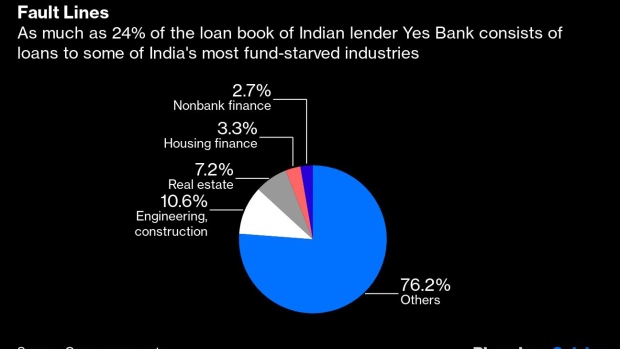Dec 10, 2019
Yes Bank Needs an Arranged Match, Or It’s No Bank
, Bloomberg News

(Bloomberg Opinion) -- Yes Bank Ltd.’s latest $2 billion rescue plan was perfect except for one minor detail: Most suitors for the beleaguered Indian lender aren’t the kind the board can really take to meet the regulator for tea. Yet in a five-hour meeting Tuesday, the directors decided to do exactly that. Jane Austen would have been proud of their desperation to marry off Yes.
Take Erwin Singh Braich, a mysterious Canadian tycoon offering to post three-fifths of the money together with a partner. Braich says he’s Canada’s richest man, but he “has no headquarters, no banker to manage his money, and is currently living in a three-star motel in the Canadian prairies,’’ write Bloomberg News reporters Natalie Obiko Pearson and Suvashree Ghosh. Braich, they show, is also the subject of a 1999 involuntary bankruptcy — orchestrated, he claims, by opponents, including his brother — which remains undischarged with more than C$13 million ($10 million) in total liabilities. But Yes Bank believes his binding offer deserves to remain on the table, so there it will be.
Two other interested buyers — Hong Kong-based SPGP Holdings, bidding jointly with Braich, and London-based Citax Holdings Ltd. — have previously shied away from putting up small sums to acquire Indian businesses in bankruptcy. In a note, Suresh Ganapathy, the Macquarie Capital Securities banking analyst in Mumbai, expressed “serious reservations regarding the quality of the board of directors who are willing to consider these kinds of investors to be large shareholders.”
The board doesn’t express an iota of self-doubt. It’s “willing to favorably consider” the $500 million offer by Citax, and decide on allotting shares in the next meeting of directors, “subject to requisite regulatory approvals,” Yes said. If those permissions materialize, they’ll show the Reserve Bank of India, the regulator, to be even more desperate than Yes.
As I’ve written before, Yes is skating on a thin layer of capital. And that’s scary. Confidence in India’s bad-loan-laden banking system is ebbing; depositors are seething over regulatory restrictions placed on accessing their own money in a failed cooperative bank. Yes, India’s fifth-largest private-sector lender, can’t be left adrift much longer. But the RBI is so distracted fighting other fires that it would rather not have to think about Yes.
If not now, when? It’s been nine months since former Deutsche Bank AG executive Ravneet Gill became chief executive officer with a mandate to clean up the bank, whose asset quality was destroyed by the previous owner-manager’s cavalier underwriting. It’s been seven months since the central bank used special powers to appoint a former deputy governor as a director. But for all the chaperoning and assurances from Gill, especially about raising funds, the outlook is getting bleaker.
Gross nonperforming loans jumped to 7.4% of total assets in September from 5% in June. Last month, the bank disclosed that the regulator had found its nonperforming assets on March 31 to be $460 million higher than it had reported earlier. “This is the third year when RBI has identified a divergence in the bank's reported financials,” Moody's Investors Service said, while lowering the bank’s credit rating by two levels to B2, deep into junk-bond territory. That cut is bound to complicate the bank’s ability to attract fresh deposits from institutions at a time when current account and savings account deposits — the cheapest source of financing — plunged 14% from a year earlier in the September quarter.
A $273 million share sale in August has shored up the Tier 1 equity ratio to 8.7%, but it’s a temporary reprieve. Yes has a quarter of its assets tied up as credit to shadow banks, real estate, and engineering and construction companies, some of the most dangerously fund-starved industries in India. IDFC Securities Ltd. estimates $7 billion of stressed loans at Yes. Assuming 65% eventually goes bad, the slippage would be more than the bank’s net worth.
It’s perhaps time to work off that very assumption. Merging the bank with a bigger franchise such as ICICI Bank Ltd. or Kotak Mahindra Bank Ltd. at a next-to-nil equity value would be a better option than continuing the ongoing fundraising charade. In other words, Yes, which has lost 87% of its market value since August 2018, needs an arranged match, brokered by the RBI.
Braich, the Canadian suitor, said he loves the logo: “If it was called ‘No Bank,’ I wouldn’t have been interested.” Even if a joke, this is serious. The shock to India’s broken financial system risks being even bigger than the collapse of infrastructure financier IL&FS Group in September 2018. The regulator must act before Yes Bank becomes, for all practical purposes, no bank at all.
To contact the author of this story: Andy Mukherjee at amukherjee@bloomberg.net
To contact the editor responsible for this story: Patrick McDowell at pmcdowell10@bloomberg.net
This column does not necessarily reflect the opinion of the editorial board or Bloomberg LP and its owners.
Andy Mukherjee is a Bloomberg Opinion columnist covering industrial companies and financial services. He previously was a columnist for Reuters Breakingviews. He has also worked for the Straits Times, ET NOW and Bloomberg News.
©2019 Bloomberg L.P.